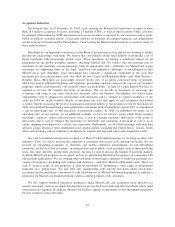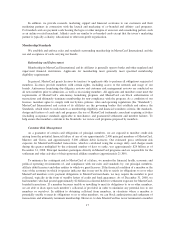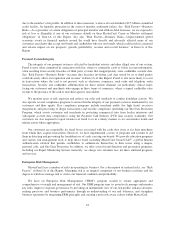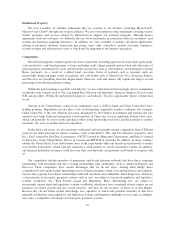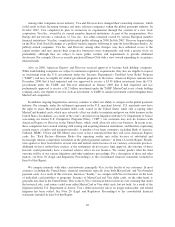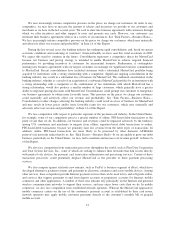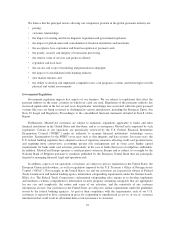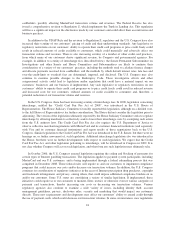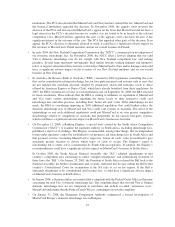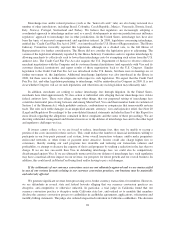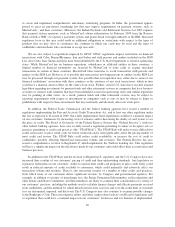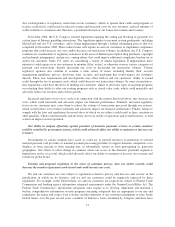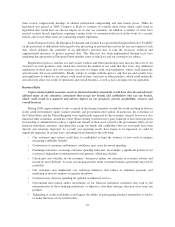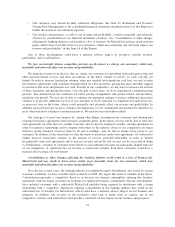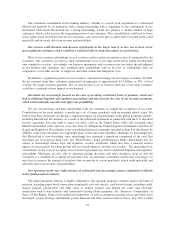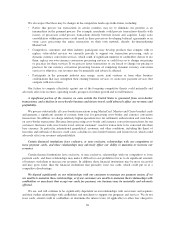MasterCard 2008 Annual Report Download - page 36
Download and view the complete annual report
Please find page 36 of the 2008 MasterCard annual report below. You can navigate through the pages in the report by either clicking on the pages listed below, or by using the keyword search tool below to find specific information within the annual report.(but never implemented) Maestro SEPA and Intra-Eurozone default interchange fees to debit card
payment transactions within the Eurozone. The decision also required MasterCard to issue certain
specific notices to financial institutions and other entities that participate in its MasterCard and Maestro
payment systems in the EEA and make certain specific public announcements, regarding the steps it has
taken to comply. The decision does not impose a fine on MasterCard, but provides for a daily penalty of
up to 3.5% of MasterCard’s daily consolidated global turnover in the preceding business year (which
MasterCard presently estimates to be approximately $500,000 U.S. per day) in the event that
MasterCard fails to comply. In March 2008, MasterCard filed an application for annulment of the
European Commission’s decision with the EU Court of First Instance. On June 12, 2008 MasterCard
announced that, effective June 21, 2008, MasterCard would temporarily repeal its then current default
intra-EEA cross-border consumer card interchange fees in conformity with the decision. Discussions are
continuing between MasterCard and the European Commission concerning what interchange fee setting
methodology MasterCard might employ and what level of interchange fees it might establish in
compliance with the decision.
Although MasterCard believes that any business practices it would implement in response to the
decision would be in compliance with the decision, the European Commission may deem any such
practice not in compliance with the decision, or in violation of European competition law, in which case
MasterCard may be assessed fines for the period that it is not in compliance. Furthermore, because a
balancing mechanism like default cross-border interchange fees constitutes an essential element of
MasterCard Europe’s operations, the decision could also significantly impact MasterCard International’s
European customers’ and MasterCard Europe’s business. The European Commission decision could
also lead to competition authorities in one or more EU Member States commencing investigations or
proceedings regarding domestic interchange fees. In addition, the European Commission’s decision
could lead to the filing of private actions against MasterCard Europe by merchants and/or consumers
which, if MasterCard is unsuccessful in its appeal of the decision, could result in MasterCard owing
substantial damages. In October 2008, MasterCard received an information request from the European
Commission in connection with the decision concerning certain pricing changes that MasterCard has
implemented as of October 2008. MasterCard submitted its response in November 2008. MasterCard
understands that the European Commission is contemplating commencing a formal proceeding
concerning the pricing changes on the basis that they contravene the decision. See Note 20 (Legal and
Regulatory Proceedings) to the consolidated financial statements included in Item 8 of this Report for
more details regarding the European Commission’s decision.
• In the United Kingdom, the Office of Fair Trading (OFT) issued a decision in September 2005
concluding that MasterCard’s U.K. credit card interchange fees contravene U.K. and European Union
competition laws. This decision was set aside by the U.K. Competition Appeals Tribunal in June 2006.
However, shortly thereafter, the OFT commenced a new investigation of our current U.K. credit card
interchange fees and announced on February 9, 2007 that the investigation also covers so-called
“immediate debit” cards. If the OFT determines that any of our U.K. interchange fees contravene U.K.
and European Union competition law, it may issue a new decision and possibly levy fines accruing from
the date of its first decision. This new investigation will examine whether the new methodology for
setting U.K. interchange fees adopted by MasterCard in November 2004—in connection with which
MasterCard withdrew the authority of the U.K. members to set domestic interchange fees and conferred
such authority exclusively on our President and Chief Executive Officer or his designee—contravenes
applicable law. MasterCard understands that the OFT is considering whether to commence a formal
proceeding through the issuance of a Statement of Objections. A negative decision could have a
significant adverse impact on the revenues of MasterCard’s U.K. members and on our competitive
position and overall business in the United Kingdom.
• In April 2001, in response to merchant complaints, the Polish Office for Protection of Competition and
Consumers (the “PCA”) initiated an investigation of our (and Visa’s) domestic credit and debit card
interchange fees. In January 2007, the PCA issued a decision that our (and Visa’s) interchange fees are
unlawful under Polish competition law, and imposed fines on our (and Visa’s) licensed financial
26


